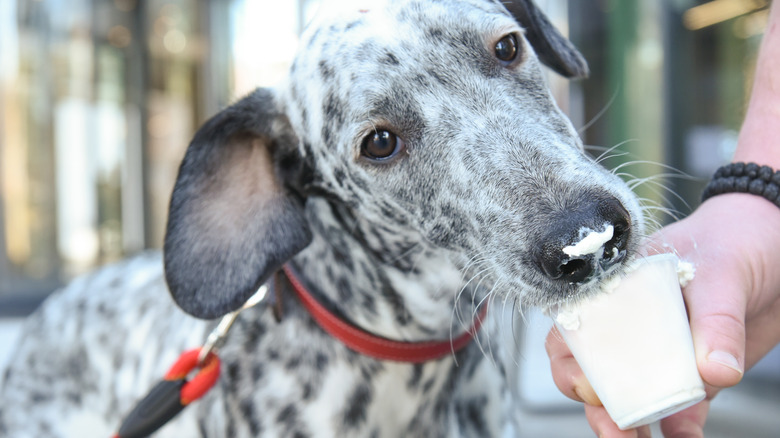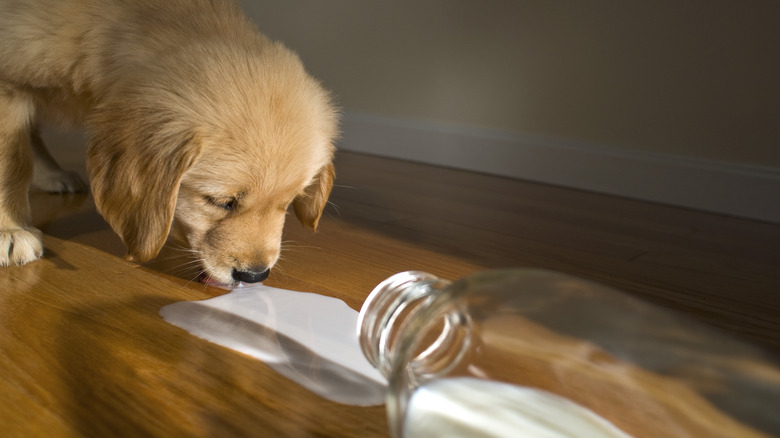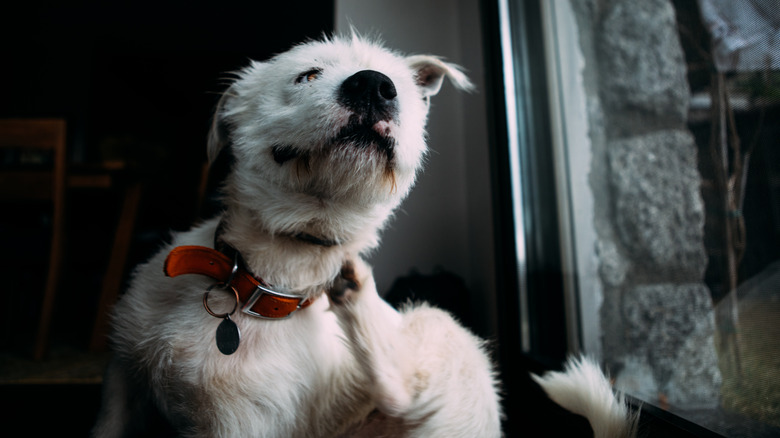Here's What Happens If Dogs Ingest Dairy
When sitting in the line at the drive-thru with your best bud in the back seat, it may be tempting to treat them to a not-so-secret puppuccino at Starbucks. But is a small amount of whipped cream, let alone dairy in general, actually safe for your dog? The answer isn't exactly straightforward.
Lactose intolerance, or trouble digesting milk products, is fairly a common issue in humans, but it also affects many dogs. At the same time, dairy is one of the most common allergens in dogs. However, an intolerance and an allergy are two completely different issues. Dr. Ishpreet Gill from Fletcher's Creek Animal Hospital told PetMD that figuring out if your pup can handle dairy is basically a matter of trial and error. "Some dogs retain the ability to digest milk all throughout their lives," Dr. Gill said. "If you give ice cream to Fluffy or Fido and they develop diarrhea, you can be reasonably sure what caused it."
If you have a dog who doesn't tolerate dairy well, ingesting it will lead to stomach upset. Symptoms of lactose intolerance in dogs include gas, diarrhea, stomach pain, and vomiting, per Animal Emergency & Referral Center of Minnesota. And often, the severity of symptoms depends on how much and what type of dairy they consume.
How much dairy is safe for dogs?
Your dog may tolerate some forms of dairy well and not others due to the varying amounts of lactose these products contain. For instance, your pup could be okay with cheese or plain yogurt but not with milk or ice cream because most cheese is relatively low in lactose and the cultures in yogurt may make it easier to digest. On the other hand, milk and ice cream have much higher levels of lactose. Moderation is also key because many dairy products are high in fat, and the overconsumption of fatty foods can lead to pancreatitis or obesity in dogs. You also want to be careful to check the ingredients before sharing with your pup; ice cream and some yogurts can contain sweeteners and ingredients like xylitol and chocolate, which are common ingredients that are toxic to dogs.
Dr. Amy Pike shared in an interview with Rover that, while dairy products such as cheese are high in good nutrients like protein and calcium, they shouldn't be relied on as sources of nutrition for your pup — Fido should get the vast majority of what they need from their main food source. But there are some benefits to giving your dog cheese or other safe dairy products. They can be helpful in training sessions, as a way to hide pills and administer medication, or to add flavor to your dog's food to get them to eat. Keep in mind, though, that treats as a whole should only make up a maximum of 15% of your dog's diet, according to Cornell Richard P. Riney Canine Health Center. So, depending on the size of your pup and how much food they eat in a day, the recommended amount of dairy will vary.
How do you know if your dog is allergic to dairy?
While lactose intolerance in dogs usually manifests itself as mild to moderate gastrointestinal issues, a true dairy allergy presents more severe symptoms. Per PetMD, common signs your dog is having an allergic reaction to dairy include itchy or red skin, infections of the skin, hair loss, or excessive licking and chewing of their feet. In rare cases, if your dog's allergy is severe, they may develop hives, facial swelling, and anaphylaxis. There can also be gastrointestinal issues with allergies as well, so it's important to keep a close eye on your pup after they've ingested dairy and get them to a vet if you notice overly concerning symptoms.
There are certain breeds that are considered to be more prone to food allergies. Those include Shar Peis, German shepherds, Labrador retrievers, Rhodesian ridgebacks, West Highland terriers, Wheaten terriers, springer spaniels, cocker spaniels, and miniature schnauzers. But that's not an exhaustive list —any dog can develop an allergy or an intolerance to dairy at any point in their life, which is why it's so important to keep track of everything your dog can and cannot eat. If you're concerned your pup has a dairy allergy, take them to the vet for testing. Keep in mind that the vet will likely run a blood panel to rule out other health conditions before determining an allergy.


